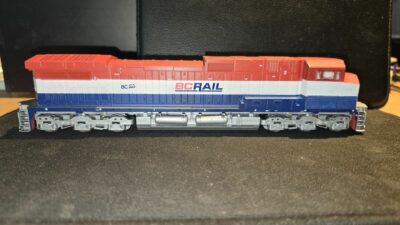
I recently aquired a sound equipped locomotive (Walthers Mainline ES44AC pictured above) and – separate from that – two Decoderwerk 70901 LokCommander mobile decoders in conjunction with two 70101 SUSI Soundmodul SUSI equipped sound modules. The first Module was ordered with a „Dash-9“ sound configuration, while the second is on order with a GP40 sound configuration to power all those SD40, SD40-2, SD45, GP 40 and Tunnelmotor engines I have in my roster. Of course any fleet upgrade needs to be tested on a single engine first.
Maybe I am a bit biased, but I do like the Walthers ESU sound a lot. It is very well balanced in regard to the sound amplification (normalized, I think is the audio pro-term for that) and pleases my ears. In addition to that, I learned the sound mapping of that engine first.

The Decoderwerk sound mapping was radically different and not well balanced, at least for my taste. The first installation used the Dash-9 configuration, which I installed in the appropriate engine (Athearn Blue Box C44-9W(L), pictured above.
However, the cost of these decoders and modules are very attractive. They cost around 50 Euros less than a comparable empty ESU – e.g. ESU 58813 LokSound 5 – or other 8 function mobile sound decoder. The latter would also need the appropriate ESU Lokprogrammer 53451 with USB Adapter, which adds another 150 Euros plus to the bill. By the way, the Amazon-Links provided here are NON-affiliate links, as the intention of this article is not revenue, but help and information.
So for the savings of the two decoders, I added a 00303 CV Programmer, PC Testmodul, Soundladeadapter (this basically translates to CV programmer, test module and sound loading adaptor) for around 85 Euros to my bill, in order to adapt the sounds and hopefully create a well or better balanced sound configuration for my engines.
The purpose of this page
This page is mainly here to assist my brain, remembering the things I found out, how to aquire and adapt sound samples and more. Please note, that I will provide links to external sources – if available – but I won’t likely include any of the sounds I use in my examples, as these would possibly be ripped from publicly available sources (like YouTube videos) and are therefore very likely copyrighted, which definitely limits their usage to private and personal use. However, I will use open source software for any sound sampling and – if possible – provide links to the source samples.
| Manufacturer | Decoder | DecoderCost | Plug/Connector | Max. samples | File type | Programmer | ProgrammerCost |
|---|---|---|---|---|---|---|---|
| DecoderWerk | 70901 + 70101 | 17 EUR + 45 EUR | Pads + SUSI Plug | 40, 16 bit | DS6 | 00303 | 85 EUR |
| Dietz | micro-IS4 V2 *) | 69 EUR | SUSI Plug | 40, 16 bit | DS6 | 00303 | 85 EUR |
| Uhlenbrock | IntelliSound 32510 | 48 EUR | SUSI Plug | 40, 16 bit | DS6 | UB 31080 **) | 79 EUR |
**) this sound module can be programmed with the Decoderwerk 00303 CV programmer / sound loader
DecoderWerk „become a sound engineer“ Software
This package can be used to create and adapt soundsamples and convert them into a decoder readable fomat (DS6). This is potentially usable with Dietz and Uhlenbrock sound decoders as well. If I get this far, I’ll provide a tutorial here.
YouTube Videos demonstrating Sound Samples
There are more…
